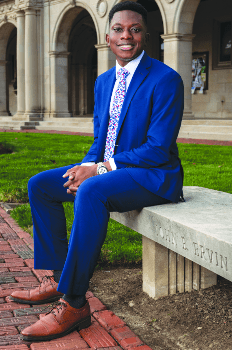Ephraim Oyetunji likes a good challenge. “Everything is a mystery to be solved,” he said. A senior biology major on the neuroscience track, Oyetunji quickly established himself as a standout researcher. He’s been named a WUSTL ENDURE scholar, a Hope Center Scholar, and a recipient of the prestigious Barry Goldwater Scholarship. Oyetunji discussed his path to WashU, his experiences in the lab, and why he’s passionate about tackling some of medicine’s biggest mysteries.
Where did your interest in biology come from?
I guess I always had an inkling for it. I’m from Nigeria, but I left when I was 2 years old. My mom came to the United States to study nursing, and, growing up, there would always be nursing textbooks on the counter.
Biology was always something I’ve been interested in, especially when I got to do research in high school. It’s not just about knowing the information but applying it to create new knowledge.
What did you research in high school?
Going into my sophomore year, I worked with C. elegans to look at a gene called WDR-23 to learn how changing histone levels could impact cell division and potentially cancer progression. The next year I worked with fruit flies to see if caffeine could help reduce symptoms of Parkinsonian neurodegeneration. And then my senior year I did work at Florida State University with human stem cells, trying to increase the rate of biological production.

(Photo: Sid Hastings/Washington University)
What made you choose WashU?
Knowing that WashU was a pre-med powerhouse was helpful. But I think the biggest pull was financial. I’m part of the John B. Ervin Scholars Program, and that’s a very big reason why I’m here. I feel everything I’ve gotten is partially, if not entirely, due to my participation in that program because the community is just so great.
When I was still in high school deciding where I wanted to go, a WashU junior who was also a Black pre-med student would call me, answer my questions, and make sure I understood everything. And that was just a great invitation to the awesomeness that is WashU.
Can you give me a rundown on your research here at WashU?
I attended a two-year summer internship program called BP ENDURE, which is a neuroscience program working to increase the number of minority scientists. My mentor Kathleen Schoch, assistant professor of neurology, introduced me to her project on Alzheimer’s research in Dr. Tim Miller’s lab. She had been focusing on one of the proteins called amyloid beta, but I was able to expand this research to also look at the tau protein. Having to think for myself and make my own decisions rather than following someone else’s procedure was a challenge at first, but ultimately really helpful.
I like that there’s a very driven community of people here who are really excited about science. It’s a very egalitarian space. I have a lot of great mentors — MDs, PhDs, grad students — but they still value my opinion as equivalent to their own when we’re tossing up ideas for what to do next, things to consider for future research, or critiques on experiments.